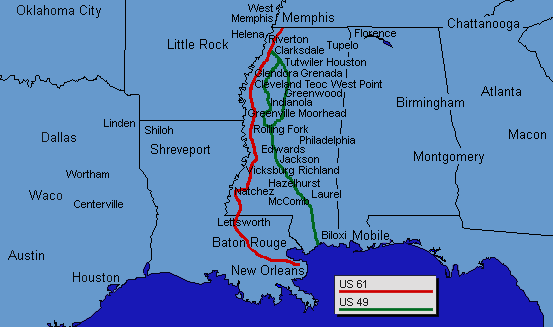
Map showing highways 61 and 49 across Mississippi. The Delta lies between Memphis and Vicksburg.
US Census map of black population in 1890.
Map of Racial Terror Lynchings, 1877-1950
The Great Migration of African Americans
Vocal resources for the blues:
“Tryin’ to Make Heaven My Home” Viola James & Congregation. African American spiritual. Recorded by Alan Lomax in 1959 in Tyro, Mississippi. Source: Southern Journey: 61 Highway Mississippi, vol. 3 (Rounder Records, 1997).
“Stewball” Unidentified Prisoners at Oakley, Mississippi. Recorded by John Lomax in 1939. The original version of this leader-response work song was an Irish ballad about a legendary race horse named Skewball. This song took several forms in America — one, the Kentucky racing horse ballad “Molly and Tenbroek,” and the other this work song known in various parts of the South. Source: Jail House Bound (Orchard Enterprises, 2014).
“Field Holler”by Thomas J. Marshall. Recorded by Alan Lomax at Edwards, Mississippi, 1939. Source: Negro Works Songs and Calls (Library of Congress, Archive of Folk Culture. Rounder Records, 1999). Read about field hollers.
Geeshie Wiley and Elvie Thomas “Last Kind Words Blues” (1930) Recorded in Grafton, Wisconsin. LYRICS
Read about Charley Patton, one of the fathers of the Delta blues.
“Spoonful” Charley Patton, 1929. LYRICS.
“Mississippi Boll Weavil Blues” A blues-ballad, performed by Charley Patton, (1929). LYRICS. What is the boll weevil?
“Pony Blues” Charley Patton (1929). LYRICS. In the AAB, approximate twelve-bar structure that becomes the “standard” blues form.
Excerpt from documentary “Rumble: The Indians Who Rocked the World”
https://emory.kanopy.com/video/rumble (2017)
“Hard Time Killin’ Floor Blues,” Skip James (1931). LYRICS.
Lucinda Williams — “Hard Time Killin’ Floor Blues” (2001)

Read about Robert Johnson.
Convict Lease System
Map of Racial Terror Lynchings, 1877-1950
The Great Migration of African Americans
Dockery Plantation
“Hell Hound on My Trail” Robert Johnson, 1937. LYRICS Source: Robert Johnson: King of the Delta Blues Singers (Columbia, 1998)
“Cross Road Blues” Robert Johnson, vocal and guitar. 1936. Source: Robert Johnson: King of the Delta Blues Singers (Columbia, 1998). LYRICS.
“Crossroads” Cream featuring Eric Clapton. 1968.
“Parchman Farm Blues,” Bukka White, vocal and guitar. Washboard Sam, washboard. LYRICS Recorded in 1940 in Chicago. This songs tells of experiences widely shared by African American men of White’s generation on Mississippi’s oppressive prison farm. Source: News & the Blues (CBS Records, 1990).
“Aberdeen Mississippi Blues” Bukka White, 1967.
“Walkin’ Blues,” Son House. Recorded by Alan Lomax for the Library of Congress at Klack’s Store, Lake Cormorant, Mississippi, August 1941.
“61 Highway Blues,” — Fred McDowell vocal and guitar; blues from the hill country of Mississippi (not the Delta) w/bottleneck slide. Recorded by Alan Lomax in Como, Mississippi, 1959. LYRICS.
This song, one of the first that McDowell recorded for Lomax, concerns the north-south highway that runs from Chicago to Memphis to the Gulf of Mexico, a road of adventure and escape for the blacks of the mid-South. Fred McDowell of Como, Mississippi treats it in the free style of the old-time country bluesmen, sliding the bottleneck with his left hand to double the melodic part, and playing a complex African-like polyrhythm with his right hand. Source: Southern Journey: 61 Highway Mississippi, vol. 3 (Rounder Records, 1997)
“Highway 61 Revisited” Written and performed by Bob Dylan. (1965) LYRICS. Read about the song and the album.
“Third Degree” Joe Savage (1978). From “The Land Where the Blues Began.” Joe Savage, former muleskinner and Parchman Farm inmate, on the levee in Greenville, Mississippi. Recorded by Alan Lomax, Worth Long, and John Bishop, on September 2, 1978.
“Third Degree,” Eric Clapton, guitar, vocal; Dave Bronze, bass guitar; Jim Keltner, drums; Andy Fairweather Low, guitar; Chris Stainton, keyboards. Live recording, 1994. Source: From the Cradle (Reprise/Time Warner, 1994) LYRICS

Cassandra Wilson “Death Letter” New Moon Daughter (Blue Note Records, 1995).
Son House, “Death Letter” (1967). LYRICS
White Stripes, “Death Letter” (2000).

LYRICS
Source: Mule Variations (1999).
For reference:
Visit the Mississippi Blues Trail
“Gravel Springs Fife and Drum” documentary film produced by David Evans, Bill Ferris, Judy Peiser (1971)